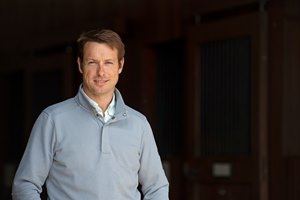Managing COVID-19: Dixiana Takes Adjustments in Stride


This is the third installment in a series of Q&A sessions with farm managers and general managers regarding how they are handling their Thoroughbred operation amid the COVID-19 pandemic.
After 18 years at different configurations of the current Betz Thoroughbreds near Lexington, Robert Tillyer returned this year to William and Donna Shively's Dixiana Farm as farm manager. In the late 1990s, Tillyer worked in an all-around capacity at Dixiana—his first Thoroughbred farm position—before finishing college in England and gaining some international experience before his work at Betz.
He returns to Dixiana at a time the Lexington-area farm is growing to nearly 1,000 acres as it adds use of its Elk Hill property. Dixiana ranks in the top 20 on the leading breeders list by earnings. The latest graded stakes win for a horse bred by the farm came in February when Midcourt took the San Pasqual Stakes (G2) at Santa Anita Park.
Personally, Tillyer has enjoyed an exciting spring as co-breeder of Ete Indien, a son of Summer Front on the Road to the Kentucky Derby. While acknowledging bigger issues, he lamented that COVID-19 has forced an added wait for this year's classic series.
Tillyer's return to Dixiana has largely coincided with the COVID-19 outbreak and social distancing policies put in place at the state and national level. He said farm workers, who number about 30, have quickly adjusted. He recently discussed operating in the new environment with BloodHorse features editor Frank Angst.
BH: With the COVID-19 outbreak going on, have you been forced to make many changes in operations?
RT: I think it's like everyone else, you try to be aware and try to keep your distance. Wearing face masks is something new.
I think for a lot of our workers, especially on the broodmare side, they're already more aware of biosecurity issues than the average person, especially when you're handling mares and foals in the foaling barn. You're constantly dipping your feet. Usually, with the newborns especially, you're wearing gowns and gloves. I think that those workers are already aware of biosecurity.
With COVID-19, it's a whole other level as it's airborne. So it's been a matter of getting used to wearing masks when we have to be in close proximity of each other. Whether you're handling a foal or working with a veterinarian with a mare, it's trying to be a lot more diligent.
BH: How much has the process in transporting a mare to a stallion changed?
RT: It has changed. Now you're no longer able to see the mare being bred. You're greeted at the unloading dock by a staff member of the farm. Before, you would take the mare and watch the mare then report back to the veterinarian or farm manager about how the mare was covered.
Now the staff member of the stallion farm is giving you that kind of report.
BH: Any other thoughts on the current situation?
RT: I think (Gov. Andy Beshear) is doing a fantastic job. He's showing incredible leadership. But it would be nice to see if we could get some protocols in place that would allow racing to return in Kentucky without spectators. If we could get some protocols in place and get horse racing going again, I think it would be a good thing. It's finding that balance.

